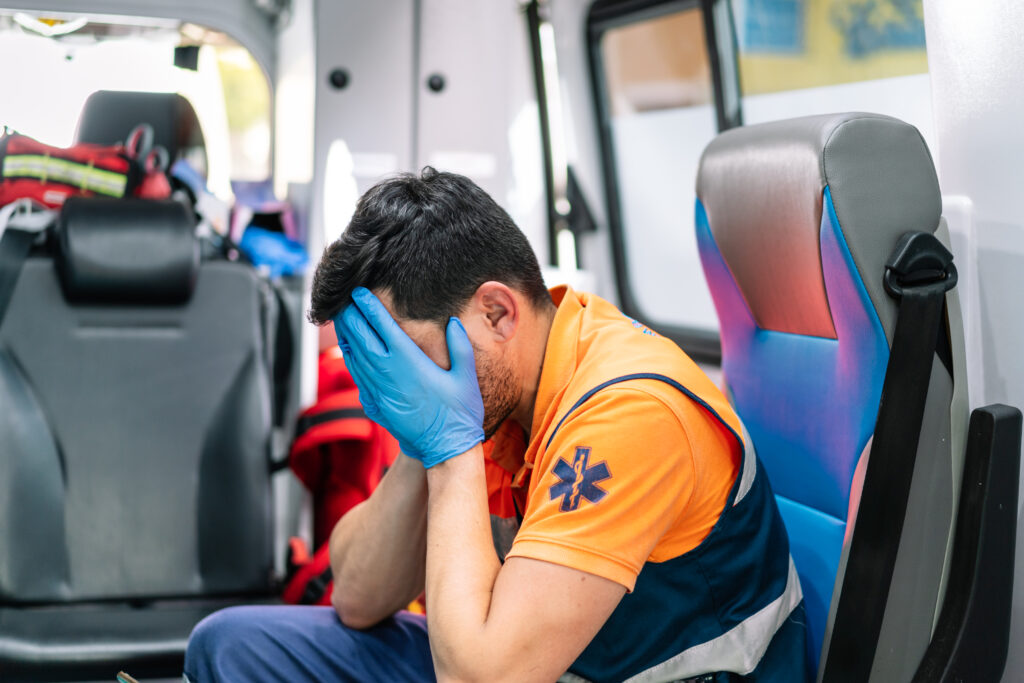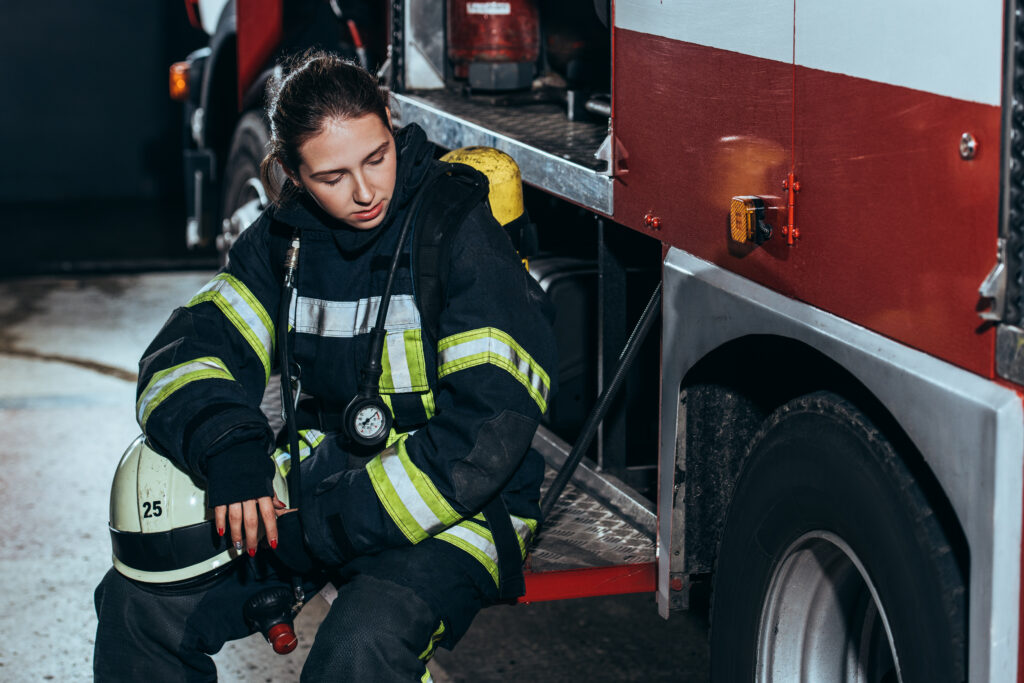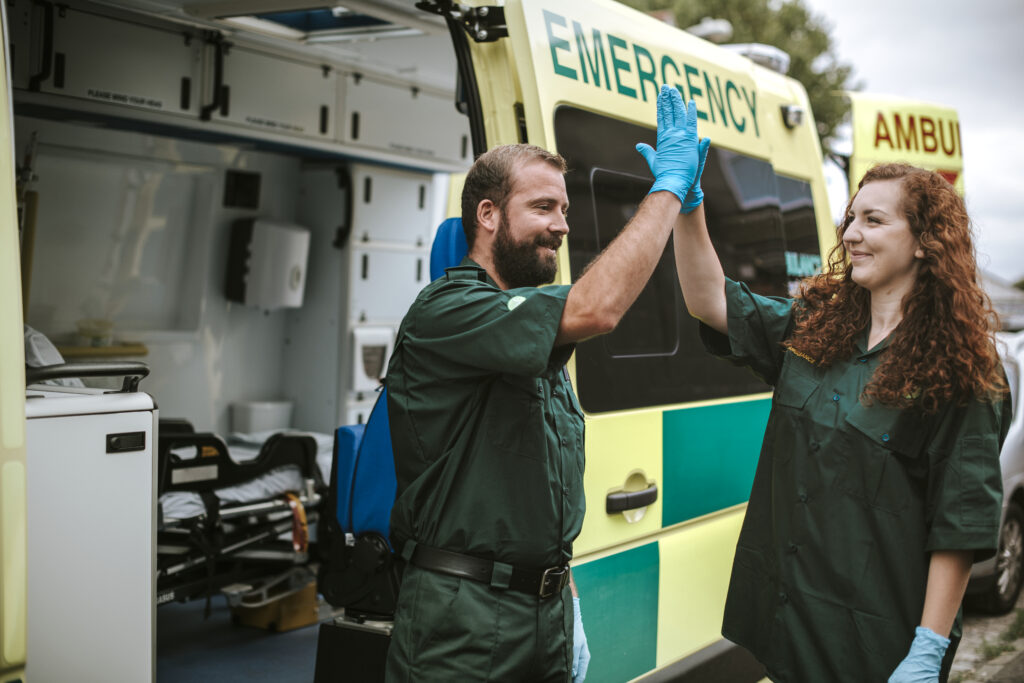
First responders operate in high-stress environments that can take a significant toll on their mental health. The intense pressure and trauma they face on a daily basis can lead to unhealthy coping mechanisms, such as alcohol use. This article explores the intersection of stress and alcohol use among first responders, highlighting the risks and advocating for healthier coping strategies. Drawing from personal accounts and expert insights, we aim to provide guidance and support for those who dedicate their lives to helping others.

First responders operate in environments where high-stakes emergencies are a constant reality. The immediacy of life-threatening situations demands a level of emotional awareness and resilience that can be taxing on even the most seasoned professionals. The psychological toll of such incidents can manifest in various forms, from acute stress reactions to more chronic mental health conditions.
The journey from being daunted by these challenges to becoming driven to overcome them is a personal and often silent battle.
First responders like paramedics, police officers, and ER doctors frequently encounter what has been termed as “cumulative stress bombs”. These are incidents that accumulate over time, potentially leading to cumulative PTSD and other long-term psychological impacts. Recognizing these effects is the first step towards developing healthier coping mechanisms and supporting those who face them daily.
Chronic stress in first responders is not just a temporary challenge; it can lead to significant and lasting health issues. The accumulation of stress over time can alter the body’s stress response system, potentially resulting in a range of physical and psychological disorders.
The key to mitigating these long-term effects lies in early recognition and intervention, emphasizing the importance of regular mental health check-ups and support systems.
It is crucial for first responders to have access to resources that help manage chronic stress effectively. Departments and organizations play a vital role in providing these resources, which include stress management training and confidential counseling services.
First responders often carry the weight of high-stakes emergencies long after the sirens fade. For many, the journey through trauma is a solitary one, marked by silent battles with memories and emotions. Yet, amidst the struggle, stories of resilience emerge, offering glimmers of hope and pathways to healing.
The path to resilience is often paved with introspection and the courage to confront one’s past. It is a testament to the human spirit’s capacity to adapt and overcome even the most harrowing experiences.
The narratives of first responders like Police Sgt. Bobby Waidler, who speaks of moral injuries as a prevalent issue, underscore the complexity of the trauma encountered in the line of duty. These personal accounts not only shed light on the challenges faced but also on the remarkable resilience that can be fostered over time.

For many first responders, the immediate relief that alcohol provides can be a tempting escape from the relentless pressures of their duties. Alcohol’s sedative effects can temporarily dull the sharp edges of stress and trauma, offering a brief respite from the mental and emotional toll of their work. However, this short-term solace can quickly lead to a dependency that masks deeper psychological issues.
The use of alcohol as a coping mechanism is a complex issue, intertwined with the culture of first responder communities and the stigma surrounding mental health.
The risks associated with turning to alcohol for stress relief are significant. Dependency can develop insidiously, often recognized only when personal and professional relationships begin to suffer. It is crucial to understand the allure of alcohol in order to address the underlying issues and promote healthier coping strategies.
The transition from using alcohol as a stress reliever to a dependency can be insidious. For first responders, the risk of substance abuse is heightened by their routine exposure to traumatic events. It’s crucial to recognize when alcohol use shifts from occasional to frequent, and when it starts to interfere with daily functioning.
The tipping point is often characterized by increased tolerance, drinking to avoid withdrawal symptoms, and alcohol-related disruptions in personal and professional life.
Understanding the signs of problematic drinking is the first step towards seeking help. Here are some common indicators:
Early intervention can prevent the progression to addiction, which is why it’s essential for first responders and their support networks to be vigilant.
The journey from addiction to recovery is deeply personal, yet universally challenging. First responders face unique pressures that can lead to alcohol use as a misguided form of self-medication. The stories of those who have walked this path illuminate the struggles and the triumphs involved in overcoming addiction.
The path to recovery is often marked by small victories and significant milestones, each one a step away from the past and towards a healthier future.
The Comprehensive Addiction and Recovery Act aims to provide essential resources for first responders, acknowledging the critical need for training and support in the face of addiction. These narratives not only offer hope but also underscore the importance of comprehensive recovery programs.

First responders are often the last to recognize the signs of their own stress and unhealthy coping mechanisms, such as excessive alcohol use. Early detection of these red flags can be crucial in preventing the development of more serious issues.
Behavioral changes in first responders may include increased irritability, social withdrawal, or a noticeable decline in work performance. Physical signs might manifest as sleep disturbances, weight changes, or unexplained aches and pains. It’s important for colleagues, friends, and family to be vigilant and aware of these indicators.
While each individual’s experience is unique, common red flags should not be ignored. Proactive attention to these signs can lead to timely support and intervention.
Recognizing these signs is the first step towards addressing the underlying stress and finding healthier ways to cope.
The involvement of colleagues and family is crucial in the early detection of unhealthy alcohol use among first responders. Colleagues, often the first to notice changes in behavior, can play a pivotal role in recognizing the signs that may indicate a problem. Family members, who see the personal side of the stress that first responders face, are also key observers.
Early detection can lead to timely interventions, potentially preventing the escalation of alcohol use to a level that requires more intensive treatment.
It is important for both colleagues and family to approach the situation with sensitivity and support, understanding that first responders may be dealing with complex emotions and experiences. By staying alert to the signs and maintaining open lines of communication, they can help guide their loved one or coworker towards healthier coping strategies and professional assistance if needed.
Intervention strategies are critical in addressing unhealthy alcohol use among first responders. Early intervention can prevent the progression of alcohol misuse to more severe dependency or addiction. It’s essential to understand the appropriate steps to take when a colleague or loved one shows signs of struggling with alcohol.
It is vital to approach the situation with empathy and without judgment, ensuring the individual feels supported rather than isolated.
The connection between addiction and emergency responders is well-documented, with many turning to substances like alcohol as a means of coping. Implementing these intervention strategies can be the first step towards recovery and healthier coping mechanisms.

First responders often face a unique set of challenges that can take a toll on their mental and physical health. Building resilience is crucial in mitigating the effects of these stressors. Mindfulness and self-care are key components in fostering this resilience. By engaging in practices such as meditation, yoga, and deep-breathing exercises, individuals can cultivate a sense of calm and control in the face of adversity.
Incorporating self-care into daily routines can significantly improve well-being. Activities like forest bathing, sound baths, and other lesser-known practices offer fresh perspectives on self-care and can be powerful tools in a first responder’s resilience toolkit. It’s important to recognize that self-care is not a one-size-fits-all solution; it requires personalization and may include a variety of activities that promote relaxation and joy.
Resilience can be enhanced by focusing on the four core components: adequate sleep, healthy eating, regular physical activity, and active relaxation. Each of these elements contributes to a stronger, more resilient self, capable of handling the rigors of first responder duties with greater ease.
Peer support networks offer a unique avenue for first responders to share experiences and strategies for managing stress and trauma. These networks capitalize on shared understanding and mutual trust, fostering an environment where individuals can speak openly about their challenges without fear of judgment. The benefits of such networks are multifaceted, including reduced feelings of isolation, increased access to coping resources, and the promotion of team cohesion.
Peer support networks not only provide emotional backing but also serve as a bridge to professional mental health services, ensuring that first responders receive the comprehensive care they need.
The effectiveness of peer support is reflected in the personal accounts of those who have found solace and strength within these groups. From reducing the sense of isolation to providing a platform for resilience, peer support networks are a vital component in the pursuit of healthier coping mechanisms for first responders.
Seeking professional help through therapy and counseling is a critical step for first responders dealing with the aftermath of stress and trauma. Therapists specializing in trauma can provide tailored support, helping individuals process their experiences and develop healthier coping mechanisms. Options range from individual and group therapy to more specialized forms such as cognitive-behavioral therapy (CBT) and eye movement desensitization and reprocessing (EMDR).
It’s essential for first responders to have access to therapists who understand the unique challenges they face. This includes familiarity with high-stakes environments and the ability to offer culturally-competent care.
Therapy can be a transformative experience, although it may present its own set of challenges. The journey through therapy often involves confronting difficult emotions and memories, but it can lead to significant personal growth and improved mental health. Here’s a list of considerations when seeking therapy:

The introduction of mental health programs and policies within first responder organizations is a critical step towards addressing the unique psychological challenges faced by these professionals. Governments and agencies are increasingly recognizing the need for such initiatives to ensure the well-being of those who protect and serve our communities.
It is essential for departments to not only implement these programs but also to continuously evaluate and adapt them to meet the evolving needs of first responders.
Tracking the effectiveness of these policies is as important as their implementation. Continuous monitoring and responsive adjustments can lead to improved outcomes for the mental and physical well-being of healthcare employees, including first responders.
Effective stress management training is crucial for first responders, who often face high-pressure situations that can lead to burnout and other stress-related issues. Departments can organize regular workshops and training sessions on stress management and resilience-building techniques. These programs are designed to offer effective tools that first responders can use in their daily lives to mitigate the effects of stress.
By integrating cutting-edge, evidence-based strategies such as cognitive behavioral and mindfulness-based practices into training, first responders can learn to manage stress in a healthy and productive manner.
The education provided should not only focus on individual coping mechanisms but also on creating a supportive environment that encourages open communication about stress and its management. This holistic approach ensures that first responders are not only equipped with personal strategies but also operate within a culture that fosters mental wellness.
Promoting a culture of openness and support within first responder organizations is essential in creating an environment where seeking help is encouraged. Destigmatizing mental health treatment among first responders is a critical step in this process. By fostering a workplace where individuals feel safe to disclose their struggles, we pave the way for healthier coping mechanisms and resilience.
Key elements to cultivate such a culture include:
It is not just about having resources available; it is about ensuring that first responders feel secure and supported when they choose to use them.
Creating this supportive environment also involves recognizing the signs of stress and substance use early. This proactive approach can prevent more severe issues from developing and promote a quicker return to well-being.
The intersection of first responder stress and alcohol use is a complex and critical issue that demands our attention. As we have explored throughout this article, the high-stress nature of first responder work often leads to the use of alcohol as a coping mechanism, with significant risks and consequences. It is imperative that we recognize the signs of unhealthy alcohol use and advocate for healthier coping strategies. Departments and organizations play a crucial role in supporting first responders, providing them with the resources and safe spaces needed to address mental health challenges. By fostering an environment of understanding and support, we can help those who serve our communities to find sustainable ways to manage stress and trauma. Let us commit to a future where first responders have the support they need to thrive, both in their professional and personal lives.
First responders are on the front lines of emergencies and disasters, facing high-stakes situations that can lead to acute stress and long-term psychological trauma. Their repeated exposure to life-threatening events, critical decisions, and the suffering of others makes them particularly vulnerable.
Alcohol may initially provide temporary relief from stress and trauma, but it can quickly become a problematic coping mechanism. It can lead to dependency, exacerbate mental health issues, and interfere with personal and professional responsibilities.
Red flags include increased alcohol consumption, drinking to cope with daily stress, changes in behavior or mood, neglecting duties or responsibilities, and withdrawal symptoms when not drinking.
Healthier coping strategies include mindfulness and self-care practices, seeking peer support, engaging in physical activity, and accessing professional therapy and counseling services.
Colleagues and family can offer emotional support, encourage the individual to seek professional help, participate in intervention strategies, and provide a non-judgmental environment for open communication.
Departments and organizations can implement mental health programs, provide training for stress management, create a culture of openness and support, and ensure access to resources for first responders to manage stress and trauma effectively.
